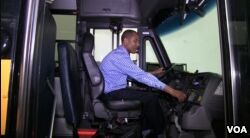正文
VOA慢速英语:埃塞俄比亚的难民在美国变得富有
Tashitaa Tufaa grew up in the Oromia region of Ethiopia. He worked on his family’s farm with his 13 brothers and sisters, until he left to become a school teacher.
In time, Tufaa became involved in politics. He helped campaign for a political party that opposed the majority Ethiopian People’s Revolutionary Democratic Front. Soon, Tufaa felt he was not safe and decided to leave.
He entered the United States in 1992 as a refugee.
Tufaa settled in Minneapolis, a large city in the northern state of Minnesota. There, he began working as a dishwasher. He also worked at manufacturing companies and as a security guard. Sometimes he had two or three jobs at the same time.

But he did not earn enough money at these jobs to support his wife and five children. So he began working evenings and weekends driving older people and people with disabilities to and from work.
He says he fell in love with transportation.
In 2003, he and his brother decided to open their own transportation company. He began with his wife’s van.
Soon, schools began using their service. School officials told other schools about the excellent service Tufaa was providing. The company grew.
Metropolitan Transportation Network now has almost 300 buses and vans that take children to schools across the state. Each day, Tufaa’s company transports more than 15,000 children to schools and other places in Minneapolis, as well as to other cities.
More than 300 people now work at the company. It recently moved to a new, larger operations center.
Tufaa says he has always worked to keep students safe.
Minnesota has long, snowy winters. Many buses bring children to their homes and drive away. But Tufaa pays his drivers to wait until the students are inside their homes or are met by an adult.
He also works to help others in the Oromo community. The Minnesota Historical Society estimates 40,000 Oromos live in Minnesota.
Tufaa helps his employees who want to start their own business. Since 2012, three former employees have started their own successful transportation companies.
Tufaa says, "The greatest gift I think you can give people like you is that it can be done and I feel like I’ve done that.”
He says his success is a lesson for all African immigrants working to become successful in the United States.
“When a person is free, you can do anything,” he said. “So appreciate what you have, work so very hard, and get rid of the wrong pride we have back home that if you have a college degree you have to be in a professional line [of work], and you can’t dig the potatoes or do the dishes. Work is work, and go out there and do what is available. Be proud of it.”
Tufaa believes his experience shows that, for those willing to work hard, anything is possible.
He told VOA, "I do not believe in giving up.”
I’m Jonathan Evans.
Salem Solomon and Tigist Geme reported this story from Minneapolis, Minnesota. Christopher Jones-Cruise adapted the report for Learning English. Kelly Jean Kelly was the editor.
We want to hear from you. Write to us in the Comments Section, or visit our www.hxen.net .




 手机网站
手机网站